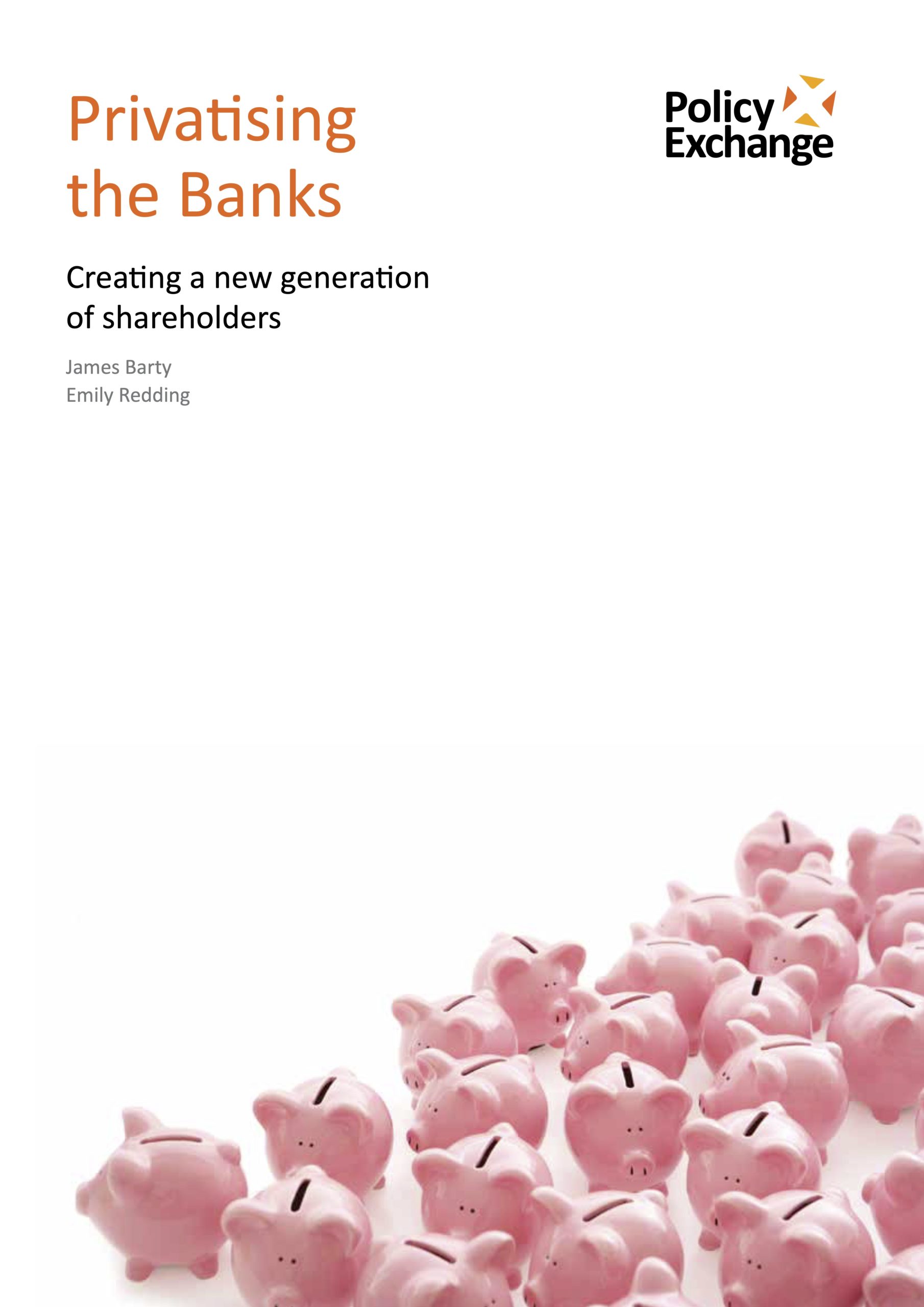
Privatising the Banks: Creating a new generation of shareholders
Up to 48 million British taxpayers would have the opportunity to receive a no risk stake in RBS and Lloyds, under a new plan that would lead to the largest privatisation ever seen in the UK.
Under the plan devised by think tank, Policy Exchange, up to £34bn of the government’s £48bn of shares in RBS and Lloyds (70%) would end up in taxpayer hands. Every British resident over the age of 18 who has a National Insurance number and is registered on the electoral roll, could apply for a share worth as much as £1,650 if the government put RBS and Lloyds back into the hands of the private sector.
The report, Privatising the Banks: Creating a new generation of shareholders, authored by James Barty, formerly head of global equity strategy at Deutsche Bank, examines all the options available to the government and concludes that a distribution of shares in both banks to taxpayers be repaid on sale, combined with an institutional and retail placing, is the best solution.
The proposal:
- 50-55% of shares in RBS and 30% of shares in Lloyds would be distributed to taxpayers who are able to apply for them at no initial cost. They are paid for at the time of sale.
- For taxpayers, this could mean somewhere between £1,100 and £1,650 worth of shares being allocated depending on the number of applicants (we estimate between 20 and 30 million).
- A floor price is established at the original level the shares are sold. If the share price falls under the floor then no-one will want to sell. As a result taxpayers would take the profits from any rise in the share price above the floor price but would not lose any money if the share price dropped below the floor price.
- If the share price never exceeds the floor price, the shares would be returned to government ownership after 10 years. This gives taxpayers confidence in taking on shares as there is no downside or upfront cost.
- The shares are held in a nominee account. Individuals can then transfer their shareholding into a personal account should they wish, providing they have paid the government the floor price.
- There would be an automated sale option if people did not want to manage their own shares on a day to day basis. For example, they could sell a quarter once the share price had risen 10%, another quarter above 20% and the rest above 30%. Alternatively they could sell the whole amount once the share price has risen by 20%.
- At the same time of the mass distribution, 25% of shares in RBS and the remainding shares in Lloyds would be sold to institutional and retail investors. The Treasury could raise approximately £17-18billion through institutional and retail sales alone.
- By offering a large portion of its shareholding to taxpayers in this way, the government would be able to move much if not all of the banks into private ownership in one go, at a better price than through a traditional sale, while at the same time giving the taxpayer the bulk of the upside and generating the conditions for a sizeable institutional and retail offering alongside the distribution.
The report found flaws in the other options to privatise the banks within two years:
- A staged sale to institutions would not allow enough time for the government to dispose of its stake in either of the two banks before the next election and would have to be sold at a discount.
- A traditional privatisation, similar to those of BT and British Gas would allow the government to sell a bigger stake in the banks by getting retail investors involved. However, the sheer size of the privatisation will only be attractive to investors with a sizeable discount. Such a discount would have to be offered to all EU citizens under EU law. There is also a risk that the share price falls due to external shocks such as a collapse in the eurozone. Only wealthier taxpayers would be able to participate in the purchase of the shares.
- A share giveaway would increase the national debt by approximately £50billion which makes the idea a non-starter. It would also risk placing significant pressure on the share price as those receiving the shares would look to sell to cash out.
Video
Testimonials
“quite robust and well researched”
H.M. Treasury
“Every so often, an opportunity comes along to spread ownership and to build a society where the many, not just the few, own a stake in society. The forthcoming reprivatisation of Lloyds Banking Group and eventually of RBS is one such moment.
“Let us hope, therefore, that George Osborne chooses to adopt a plan out today from Policy Exchange, an influential think-tank…”
Allister Heath – Editor, City A.M.
“…a system whereby the public purse recoups its investment and the individual takes any profits – such as has been suggested by the Policy Exchange think-tank – has much to recommend it.”
The Independent


